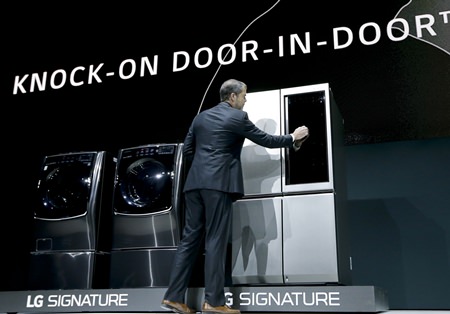Las Vegas (AP) – Umbilical cord? These days, it’s more like a USB cord.
Whether in the womb or in one’s twilight years, our lives are becoming ever more connected. Nowhere has that been more evident than at the annual CES gadget show in Las Vegas, where everything from pregnancy tests to beds to dog bowls now come with apps at the ready, collecting valuable data along the way.
Some offer solutions; others think they’re “smart.” One starts at the very beginning: life itself.
Bluetooth for babies
Until now, that three-minute wait for a home pregnancy-test result comes with no built-in distraction beyond staring at the stick to see if one line or two is fading in. No longer. First Response will start selling a Bluetooth-enabled test in the spring that links with a woman’s smartphone, recommending BuzzFeed quizzes and videos or health-related articles to pass the time while a clock ticks down the seconds to her result.
 David VanderWaal, vice president of marketing for LG Electronics USA, knocks on the door of a new LG Signature refrigerator during a news conference preview for CES International, in Las Vegas. LG Electronics lets you peek through an opaque glass window on one of the double-doors that lights up from the inside with a tap, saving electricity and maybe keeping you from making a poor decision about a late night snack. (AP Photo/Gregory Bull, File)
David VanderWaal, vice president of marketing for LG Electronics USA, knocks on the door of a new LG Signature refrigerator during a news conference preview for CES International, in Las Vegas. LG Electronics lets you peek through an opaque glass window on one of the double-doors that lights up from the inside with a tap, saving electricity and maybe keeping you from making a poor decision about a late night snack. (AP Photo/Gregory Bull, File)
The test, which could cost $14.99 or $21.99 depending on the retailer, also claims to tailor itself to the test-taker from the very first yes or no question: Do you want to have a baby? And it doesn’t stop once the test is done, as it can track a potential due date, add that to a woman’s phone calendar and offer to share the news with selected friends and relatives via email or text.
Man’s best Bluetooth-enabled friend
Call it torture or training, but the creators behind Clever Pet hope their $299 light-up dog dish can teach critical thinking to canines. The bowl dishes out portions of food if the pet paws at the correct light; if all goes well, it might eventually train them not to inhale a bowl of food all at once.
The company created several games with the lights that get progressively more difficult the better the dog gets at winning the food. The dog’s owner gets all the data.
“A persistent dog will always get food,” said Philip Meyer, the company’s product officer. “A motivated dog will get it faster.”
Smart fridge, smart bed
No need to open the fridge door to know what’s left inside. LG Electronics will let you peek through an opaque glass window that lights up from the inside with a tap, saving electricity and possibly preventing your next poor late-night-snack decision. With a different fridge, stocking up wouldn’t require a grocery run; one from Samsung and MasterCard comes equipped with an installed ordering app in the appliance.
Another company contends you don’t need a smart fridge to make yours a thinker. The company Smarter expects by summer to begin selling mats with sensors and in-fridge cameras that can remotely tell you what’s left in your fridge. They’ll set you back $130 to $150 each.
Making beds smarter is Beddit’s goal. The company’s thin belt-length sensors sold for $149 go under the sheet and are supposed to measure your heart rate, respiration and restless tossing and turning throughout the night.
Watering down the water use
Some gizmos promise easier ways to cut down on water use, particularly in drought-stricken areas. Nascent Objects’ $100 Droppler is to water what the app Shazam is to music; it listens closely to the running water in a faucet to tell you how much you’ve likely used.
Oakland-based Edyn, which debuted a solar-powered soil moisture detector last year, introduced a $60 solar-powered water valve going on sale early this year. Its app-accompanied gadget will only water plants when they need it. A smart showerhead called Hydrao has lights that change from green to red the more water you use; of course, it also sends the data to an app.
Big Mother
The mother hub is watching. Sen.se’s Silver Mother hub, that is, which aims to help adult children or caregivers make sure that an elderly person living alone takes his or her pills, drinks enough water and goes about other daily routines.
The small plastic figure resembles a Russian nesting doll that can nudge seniors with some not-so-subtle hints – the sound of running water, for instance, might remind someone it’s time to drink some water. It can also call in with recorded reminders that it’s pill-taking time or send alerts to caregivers and loved ones if something seems awry.
For $290, you get the hub and four sensors you can program and monitor from an app.
AP writers Ryan Nakashima in Las Vegas and Mae Anderson in New York contributed to this report.




